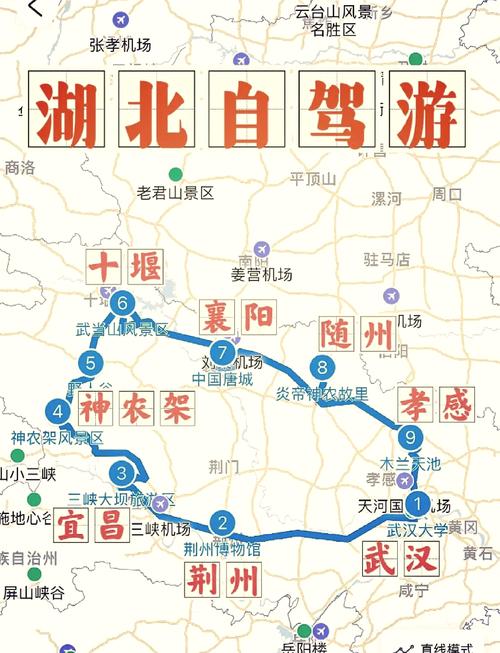经典山水风光线(鄂西环线,5-7天)
这条线路串联起了湖北最负盛名的自然奇观,被誉为“湖北最美自驾线”,全程路况良好,适合各类车辆。

核心亮点: 神农架的原始神秘、恩施的峡谷奇景、三峡的壮丽风光。
推荐行程: 武汉 → 宜昌 → 恩施 → 神农架 → 十堰 → 武汉
每日详细安排:
-
Day 1: 武汉 → 宜昌 (约3.5小时,280公里)
 (图片来源网络,侵删)
(图片来源网络,侵删)- 上午:从武汉出发,沿G50沪渝高速前往宜昌。
- 下午:抵达宜昌后,可以先游览【三峡人家】,这里将“三峡文化”与“巴人文化”完美融合,有壮丽的峡谷风光和浓郁的民俗风情。
- 晚上:入住宜昌市区,品尝著名的“三峡鱼”和“宜都排骨”。
-
Day 2: 宜昌 → 恩施 (约3.5小时,280公里)
- 上午:前往恩施,下午游览【恩施大峡谷】,这里是“中国的科罗拉多”,拥有世界奇山“一炷香”和壮丽的喀斯特地貌景观,建议乘坐上行索道,步行下山,全程约4-5小时。
- 晚上:入住恩施市区或女儿城附近,晚上可以去【恩施土家女儿城】逛逛,感受土家族风情,观看民俗表演,品尝摔碗酒。
-
Day 3: 恩施 → 神农架 (约4小时,280公里)
- 上午:从恩出发,前往神农架木鱼镇,沿途风景秀美,山路蜿蜒,自驾乐趣十足。
- 下午:游览【神农顶风景区】(建议提前预约),这里是华中第一峰,可以看到“华中屋脊”的标志,还能在大、小神农顶附近偶遇金丝猴,游览时间较长,需备好干粮和水。
- 晚上:入住木鱼镇,这里是神农架的旅游服务中心,设施齐全。
-
Day 4: 神农架深度游
- 上午:游览【天燕景区】或【大九湖国家湿地公园】,天燕景区有奇峰怪石和云海;大九湖则是一片高山湿地,被称为“湖北的呼伦贝尔”,风景如画,适合悠闲漫步。
- 下午:可以选择去【神农坛】或【香溪源】(王昭君故里)游览。
- 晚上:继续入住木鱼镇。
-
Day 5: 神农架 → 十堰 (约3.5小时,220公里)
- 上午:从神农架出发,前往十堰市武当山特区。
- 下午:游览【武当山风景区】,作为道教圣地和世界文化遗产,武当山以“72峰朝大顶,24涧水长流”的奇观著称,可以乘坐索道上山,游览金顶、紫霄宫等核心景点。
- 晚上:入住武当山脚下或十堰市区。
-
Day 6: 十堰 → 武汉 (约4.5小时,450公里)
- 上午:如果时间充裕,可以在十堰市区逛逛,或者去【东风汽车工业旅游区】感受现代工业文化。
- 下午:踏上返程,结束愉快的鄂西环线之旅。
三峡文化体验线(宜昌+三峡大坝,2-3天)
这条线路聚焦于“三峡”这一世界级IP,适合时间有限,但对工程奇观和历史文化有浓厚兴趣的游客。
核心亮点: 三峡大坝的雄伟、西陵峡的险峻、屈原故里的文化底蕴。
推荐行程: 武汉 → 宜昌 → 三峡大坝 → 三峡人家 → 武汉
每日详细安排:
-
Day 1: 武汉 → 宜昌 → 三峡大坝
- 上午:从武汉出发,抵达宜昌。
- 下午:游览【三峡大坝旅游区】,这里是当今世界最大的水利枢纽工程,必看景点包括坛子岭(俯瞰大坝全景)、185观景平台(平视大坝)和截流纪念园,建议游玩4-5小时。
- 晚上:入住宜昌市区。
-
Day 2: 宜昌 → 三峡人家 → 武汉
- 上午:游览【三峡人家】(见上文),体验巴楚文化和峡谷风光。
- 下午:如果对古建筑感兴趣,可以顺路去看看【黄陵庙】(三峡大坝蓄水后形成的孤岛上的古庙)。
- 傍晚:从宜昌返回武汉,结束行程。
红色文化与荆楚古韵线(武汉-黄冈-咸宁,2-3天)
这条线路围绕湖北的核心区域展开,既有波澜壮阔的革命历史,也有深厚的楚文化底蕴和温泉资源。
核心亮点: 黄冈的革命精神、咸宁的温泉与桂花、武汉的都市繁华。
推荐行程: 武汉 → 黄冈 → 咸宁 → 武汉
每日详细安排:
-
Day 1: 武汉 → 黄冈 (约1.5小时,80公里)
- 上午:从武汉出发,前往黄冈市。
- 下午:游览【红安黄麻起义和鄂豫皖苏区纪念园】,了解中国革命的历史,或者去【英山毕升温泉】体验一下(英山属于黄冈,但靠近咸宁)。
- 晚上:返回黄冈市区或咸宁市住宿。
-
Day 2: 黄冈/武汉 → 咸宁 (约1-1.5小时,80-100公里)
- 上午:从武汉或黄冈前往咸宁市。
- 下午:游览【三国赤壁古战场】(赤壁市),感受“火烧赤壁”的历史风云,之后可以去【汀泗桥北伐战争遗址】(咸安区)了解近代革命史。
- 晚上:享受咸宁特色【温泉】(如三江、碧桂园等),放松身心。
-
Day 3: 咸宁 → 武汉
- 上午:可以在咸宁市区逛逛,采购一些【桂花糕】、【麻塘坳温泉萝卜】等特产。
- 下午:返回武汉,结束行程。
诗画田园与休闲度假线(咸宁-黄石-鄂州,2-3天)
这条节奏较慢,适合家庭出游或寻求宁静放松的朋友,以田园风光、湖泊和古镇为特色。
核心亮点: 龙感湖的候鸟、梁子湖的生态、仙岛湖的秀美。
推荐行程: 武汉 → 鄂州 → 黄石 → 咸宁 → 武汉
每日详细安排:
-
Day 1: 武汉 → 鄂州 (约1小时,60公里)
- 上午:从武汉出发,前往鄂州。
- 下午:游览【梁子岛风景区】,梁子湖是中国第二大淡水湖,水质清澈,梁子岛是湖中一个秀丽的岛屿,可以环岛骑行,品尝湖鲜。
- 晚上:入住梁子岛或返回鄂州市区。
-
Day 2: 鄂州 → 黄石 (约1小时,50公里)
- 上午:前往黄石,游览【仙岛湖风景区】,被誉为“荆楚第一山水画卷”,湖中有100多个岛屿,风景如画,可以乘船游湖。
- 下午:如果对工业文化感兴趣,可以去【汉冶萍遗址博物馆】或【**铜绿山古铜矿遗址】】看看。
- 晚上:入住黄石市区。
-
Day 3: 黄石 → 咸宁/武汉 (约1.5小时,100公里)
- 上午:可以顺路去【龙感湖国家级自然保护区】(位于黄梅县,靠近黄石方向),这里是候鸟越冬的天堂,冬季尤其壮观。
- 下午:从咸宁或直接从黄石返回武汉。
自驾游实用贴士
- 最佳季节:
- 春季(3-5月): 全省繁花似锦,气候宜人,是出行的好时节。
- 秋季(9-11月): 秋高气爽,鄂西地区层林尽染,尤其是神农架和武当山




